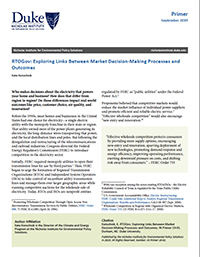Nicholas Institute for Environmental Policy Solutions
Publisher
The RTOGov project seeks to explore the links between decision-making processes and outcomes in our power markets. How does governance differ across RTOs/ISOs? Are there correlations to be made between these differences and divergent market features? Is there a way to map alternative market outcomes, based on modest changes to stakeholder voting eligibility or the power to propose reforms? For regions of the country contemplating new competitive electricity markets (or expansion of existing markets) what governance features should be adopted or adapted to meet their needs? And finally, is it time for FERC to revisit RTO/ISO governance principles, or provide more direction, to build on lessons learned over 20 years?
Led by researchers at Duke University and funded through a generous grant from the Alfred P. Sloan Foundation, RTOGov is a growing network of researchers exploring the most important decision-making bodies never heard of in the United States. Scholars from institutions such as Boise State, Ohio State, Penn State, Dartmouth, Vermont Law School, and the Colorado School of Mines will penetrate these complex issues and identify best practices to guide internal market governance dialogues as well as FERC oversight. Most of all, RTOGov will test the theory that the RTO decision-making process is not simply abstract formalities, but a powerful influence on electricity market outcomes—and a critical tool, if designed and wielded effectively, for harnessing market forces to deliver affordable, reliable, innovative, and increasingly clean power to America.



